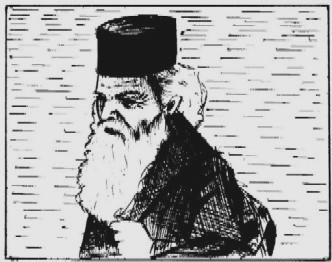![]() Orthodox
Heritage
Orthodox
Heritage![]()
Home Message of the Month Orthodox Links Prophecies Life of St. POIMEN About Our Brotherhood
Receive Our Periodical Order Orthodox Homilies / Publications
Contact UsMESSAGE OF THE MONTH
(February 2008)
The Decalogue of the Ordained Chanter
From the book “The Unwritten Typikon of the Eastern Orthodox Church”, by Reader Ioannis H. Damarlakis, translated by Fr. Luke Hartung.

The Decalogue of the ordained chanter is as follows:
1. To stand at the hour of the Divine Services in a posture of regal humility without unnecessary movements, facial gestures, etc.
2. To always wear the holy rasso and to try to have his helpers also wear rassos. This gives solemnity.
3. To always chant from the books of our Byzantine Ecclesiastical Music, in accordance with the canon of the Ścumenical Synod of Laodicea “chanting from parchments”.
4. To always chant the same — whether he is alone in the Church or whether the entire congregation is present—for in all occasions he chants to God, Who is everywhere present.
5. To unite the mood of the psalmody with the meaning of the hymn. For example, the diatonic tone is chanted one way on Holy Thursday and another on Pascha. Namely he should chant colorfully and not plainly.
6. To respect the liturgizing priests and his brethren and work peacefully with them.
7. From the moment in which he dons the holy rasso and begins to perform his holy duty, he should take leave of “every earthly care”.
8. To pronounce the readings and chant the melodies pleasantly and meaningfully so that the faithful may understand and participate.
9. To know that every exaggeration during the time he chants causes irreparable damage.
10. He should participate in the things taking place in the divine services, so that the words of the troparion are not fulfilled in him that say: “Many times while chanting, I am found committing sin, [for with my tongue I pronounce songs of praise, yet in my soul I think unseemly things]” (from the Aposticha of the Praises, Third Tone, Monday morning)”.
The ordained chanter as lower clergy must behave accordingly. His general appearance (attire, hair, etc.) should always “show” his office/ministry. He is first and foremost a “churchman” and to be successful in his work, he must live a life of virtue, “in study, in learning, in faith, in fasting, in patience and obedience”.
There are two choirs, right and left. In today’s understanding, the right is considered the first choir while the left the second. In older times the primacy switched between the two choirs each week; the right choir one week and the left choir the next. All that remains of this practice today is in the small vespers when the left choir has the primacy, while at great vespers it is the right.
